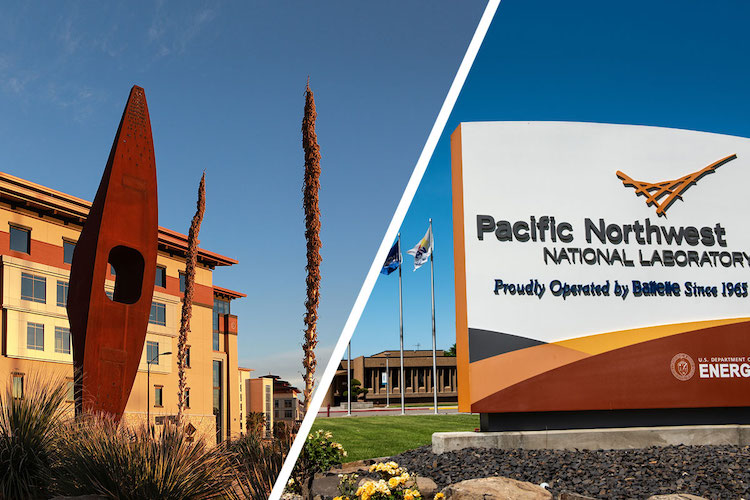
UTEP Expands Partnership with Pacific Northwest National Laboratory
Last Updated on August 12, 2020 at 12:00 AM
Originally published August 12, 2020
By UC Staff
UTEP Communications
EL PASO, Texas – The University of Texas at El Paso and the Pacific Northwest National Laboratory (PNNL) have signed an agreement to create new research and internship opportunities for University faculty members and students.

PNNL, located in southeastern Washington, near the border with Oregon, is part of the network of U.S. Department of Energy national laboratories. With an annual budget of more than $1 billion, the facility employs more than 4,700 scientists, engineers and other professionals.
“This partnership with PNNL strengthens UTEP research and opens opportunities for students,” UTEP President Heather Wilson said. “We advance discovery of public value and look forward to building this relationship over the long term.”
Anchored by a new joint appointment agreement between the two institutions, the partnership will create opportunities for UTEP faculty members to work at PNNL on research areas that are priorities for the University and for the national lab. Some of those key areas include cyber operations and cyber security, materials science, applied mathematics and advanced manufacturing.
“This new partnership will provide a high level of flexibility for UTEP faculty members to work at PNNL during the summers, to visit the lab and to seek funding for research,” said Roberto Osegueda, Ph.D., UTEP Vice President for Research. “At the same time, PNNL administrators will keep their eyes open for possibilities to work with UTEP. Also, if they need our academic expertise, this new mechanism will allow us to provide that and support their research efforts in an expedited manner.”
As part of the new partnership, UTEP and PNNL also will seek to expand the student talent pipeline that exists between the two institutions. UTEP students participate regularly in summer internships at PNNL, and PNNL has agreed to seek to expose more UTEP students to its research as interns.
“That is the value of a joint appointment program,” said Ed Monarez, a strategic advisor at PNNL and one of the architects of the new partnership. “Having someone at PNNL, or working at UTEP, that can identify students who can contribute to our research and our mission even while they’re undergrads or graduate students is one the most important benefits of this relationship.”
The first member of the UTEP faculty chosen for this role was Julien Chaput, Ph.D., assistant professor in the Department of Geological Sciences. Chaput’s research centers on applied mathematics problems inside and outside of geosciences. He arrived in Seattle in early July for a two-month summer appointment with PNNL’s Computing and Analytics division and joined a group that works on issues like pattern learning and speech recognition. It’s the kind of work that could one day help Amazon’s Alexa understand sarcasm or, if applied to seismology, help researchers tease out important findings from the massive data sets produced by their instruments.
Chaput said that even within that specialized area of research, he quickly recognized the potential for synergy between UTEP and PNNL.
“There’s good overlap,” Chaput said. “We have the capability to learn what they’re doing and then immediately try to go apply it to something that is relevant to us. It’s a fruitful relationship.”
Chaput added that he already plans to start recruiting graduate students with sharp quantitative reasoning skills upon his return to UTEP for the fall semester.
A second UTEP researcher, Jose L. Bañuelos, Ph.D., assistant professor in the Department of Physics, plans to start work soon on intermolecular interactions as part of a joint appointment at PNNL. In his case, some of the work will take place at UTEP.
PNNL also virtually hosted Christopher Kiekintveld, Ph.D., associate professor in the Department of Computer Science, as part of its Mathematics for Artificial Reasoning in Science Series in April, and there are plans for presentations from at least two more UTEP faculty members.
Future possibilities for collaboration include the placement of a PNNL researcher on the UTEP campus, positions for UTEP faculty members in PNNL advisory boards and vice versa, as well as joint work on projects in additive manufacturing or 3D printing.
The University of Texas at El Paso is one of the largest and most successful Hispanic-serving institutions in the country, with a student body that is over 80% Hispanic. It enrolls more than 25,000 students in 167 bachelor’s, master’s and doctoral programs in 10 colleges and schools. With more than $100 million in total annual research expenditures, UTEP is ranked in the top 5% of research institutions nationally and fifth in Texas for federal research expenditures at public universities.
